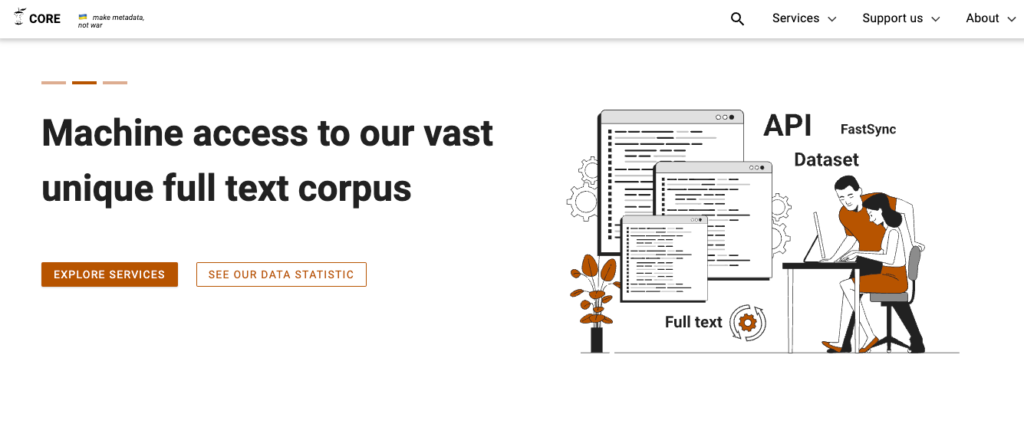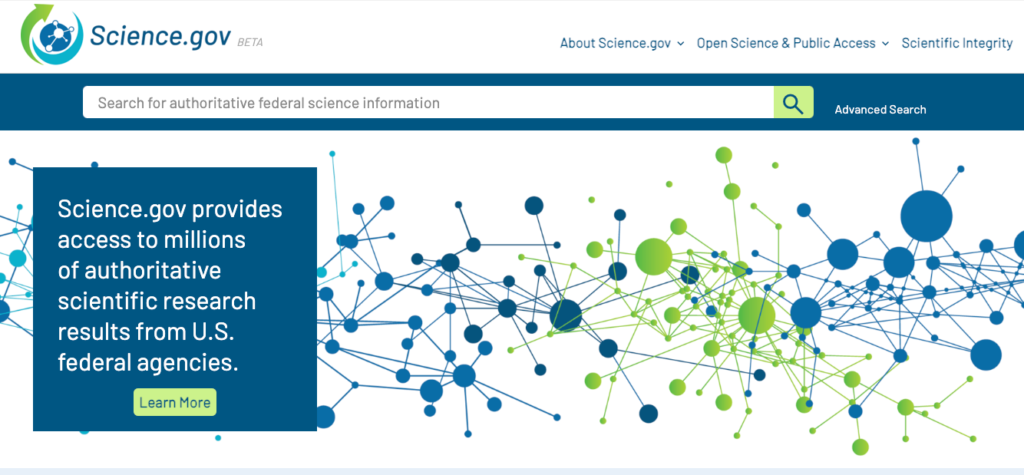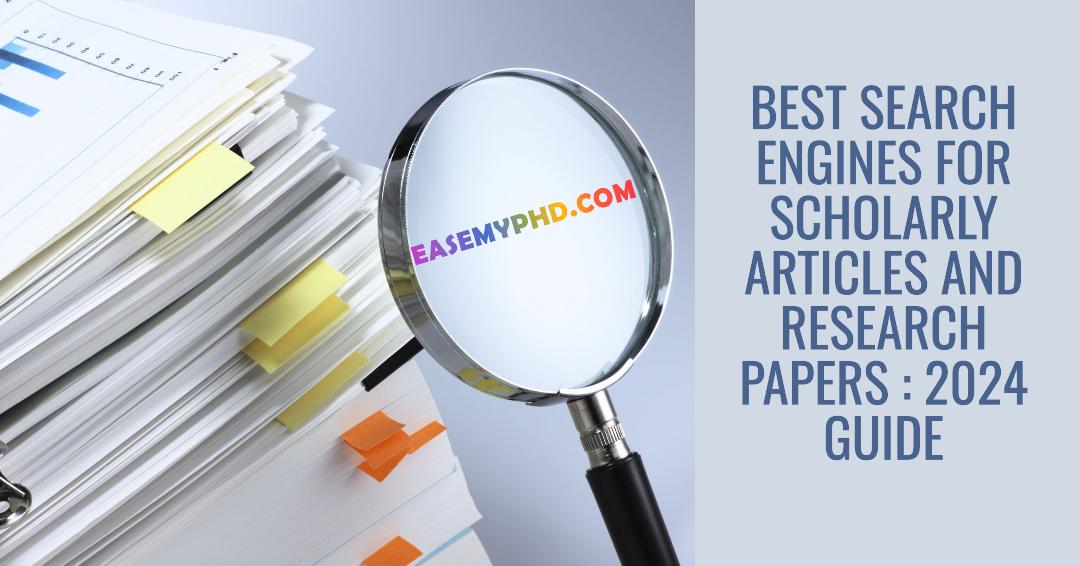In the rapidly evolving landscape of academic research, having access to the best scholarly search engines is indispensable. These platforms facilitate the discovery of high-quality research across various disciplines, ensuring that scholars, students, and professionals can access the information they need efficiently. Here are the top 10 academic search engines for scholarly articles in 2024, each offering unique features to enhance your research experience.

Top 10 Best Academic Search Engines for Scholarly Articles in 2024
- Top 10 Best Academic Search Engines for Scholarly Articles in 2024
- Google Scholar
- BASE
- CORE
- Science.gov
- Semantic Scholar
- Baidu Scholar
- RefSeek
- Scopus
- PubMed
- JSTOR
- Conclusion
- FAQs
- 1. What is an academic search engine?
- 2. Why should I use an academic search engine instead of a regular search engine?
- 3. Is Google Scholar free to use?
- 4. What types of documents can I find on BASE?
- 5. How does Semantic Scholar enhance search results with AI?
- 6. Can I access full-text articles on PubMed?
- 7. What makes Scopus a reliable academic search engine?
- 8. Are all articles on CORE open access?
- 9. How do I use advanced search options on JSTOR?
- 10. Is it possible to track citations using Google Scholar?
- 11. Can I search for non-English articles on Baidu Scholar?
- 12. Do I need an account to use these academic search engines?
- 13. How can RefSeek help with academic research?
- 14. What kind of content is available on Science.gov?
- FAQs
Google Scholar

Introduction to Google Scholar
Google Scholar is the top academic search engine, offering access to a vast range of scholarly articles and patents. It combines the power of Google search technology with academic research, making it a go-to resource for researchers worldwide.
Key Features
- Massive Database: Approximately 200 million articles.
- Access to Full Texts: Often provides links to full-text PDFs.
- Citation Tracking: Easily find cited by, references, and related articles.
- Export Formats: Supports APA, MLA, Chicago, Harvard, Vancouver, RIS, and BibTeX formats.
Benefits of Google Scholar
- Comprehensive Search: Covers all academic disciplines.
- User-Friendly Interface: Easy navigation and advanced search capabilities.
- Alerts and Updates: Stay informed on new publications in your field.
Reviews and Usage Tips
While there are no public reviews available, users should leverage Google Scholar’s extensive database and citation management tools for efficient research.
BASE

Introduction to BASE
Hosted by Bielefeld University, BASE (Bielefeld Academic Search Engine) specializes in academic content and offers access to a substantial number of research papers across various disciplines.
Key Features
- Coverage: Approximately 136 million articles, including duplicates.
- Abstracts and Summaries: Provides abstracts for better understanding.
- Export Formats: Supports RIS and BibTeX.
Benefits of BASE
- Free Access: No cost to access millions of scholarly publications.
- Focus on Academic Content: Ensures the search is relevant and useful.
- User-Friendly Interface: Simplified navigation for efficient searches.
Reviews and Usage Tips
BASE is a powerful tool for accessing a wide range of academic publications. Its free access and user-friendly design make it ideal for students and researchers.
CORE

Introduction to CORE
CORE is dedicated to open-access research papers, making scholarly articles freely available to users. It emphasizes accessibility and ease of use.
Key Features
- Coverage: Approximately 136 million articles.
- Full Text Access: All articles are open access.
- Export Formats: Supports BibTeX.
Benefits of CORE
- Open Access: Ensures free availability of research papers.
- Enhanced Discovery: Easily find related articles to expand your research.
- Simple Interface: Navigate and access content effortlessly.
Reviews and Usage Tips
CORE is an excellent resource for researchers seeking open-access publications. Its focus on freely available content makes it a valuable tool for expanding research horizons.
Science.gov

Introduction to Science.gov
Science.gov offers free access to a vast array of scientific articles and reports from more than 15 U.S. federal agencies. It centralizes resources for easier access.
Key Features
- Coverage: Approximately 200 million articles and reports.
- Abstracts and Full Text Links: Available for some databases.
- Export Formats: Supports APA, MLA, RIS, and BibTeX.
Benefits of Science.gov
- Centralized Access: Aggregates information from multiple federal agencies.
- Extensive Database: Covers a wide range of scientific disciplines.
- Efficient Searches: Saves time by centralizing access to resources.
Reviews and Usage Tips
Science.gov is an invaluable resource for accessing a broad spectrum of scientific research. Its centralized access and comprehensive database make it a top choice for researchers.
Semantic Scholar

Introduction to Semantic Scholar
Semantic Scholar uses AI-powered algorithms to provide relevant and impactful search results. It helps researchers uncover hidden connections and links between research topics.
Key Features
- Coverage: Approximately 40 million articles.
- AI-Powered Search: Delivers more relevant search results.
- Export Formats: Supports APA, MLA, Chicago, and BibTeX.
Benefits of Semantic Scholar
- Enhanced Search Capabilities: AI algorithms improve search accuracy.
- Detailed Information: Access abstracts, related articles, and citations.
- User-Friendly Design: Easy to navigate and use.
Reviews and Usage Tips
Semantic Scholar’s AI-driven approach makes it a powerful tool for uncovering valuable research insights. Its focus on relevant results enhances research efficiency.
Baidu Scholar

Introduction to Baidu Scholar
Baidu Scholar provides access to a vast collection of academic papers in both English and Chinese. It is an excellent resource for multilingual research.
Key Features
- Coverage: Approximately 100 million articles.
- Multilingual Search: Supports searches in English and Chinese.
- Export Formats: Supports APA, MLA, RIS, and BibTeX.
Benefits of Baidu Scholar
- Large Database: Extensive collection of scholarly articles.
- Free Access: No cost for accessing research papers.
- Multilingual Interface: Facilitates research across languages.
Reviews and Usage Tips
Baidu Scholar is a valuable resource for researchers seeking multilingual content. Its extensive database and free access make it a useful tool for academic research.
RefSeek

Introduction to RefSeek
RefSeek searches more than one billion documents from academic and organizational websites. Its clean interface makes it especially user-friendly.
Key Features
- Coverage: Approximately 1 billion documents.
- Abstracts: Provides snippets of the article.
- Full Text Links: Available for some documents.
Benefits of RefSeek
- Wide Range of Content: Access a vast collection of documents.
- Simple Interface: Easy to use, even for beginners.
- Free Access: No cost for accessing documents.
Reviews and Usage Tips
RefSeek’s extensive database and simple interface make it an excellent choice for students and new researchers. Its wide range of content ensures comprehensive research coverage.
Scopus

Introduction to Scopus
Scopus focuses on high-quality, peer-reviewed publications, offering a reliable source of academic research. It includes advanced search options for detailed research.
Key Features
- Coverage: Millions of peer-reviewed publications.
- Accurate Search: Advanced search filters for precise results.
- Author Tracking: Monitor citations and authorship.
Benefits of Scopus
- Trusted Content: Focus on peer-reviewed publications ensures reliability.
- Advanced Search Options: Refine searches for better results.
- Comprehensive Database: Extensive coverage across disciplines.
Reviews and Usage Tips
Scopus is a trusted resource for high-quality academic research. Its advanced search options and comprehensive database make it ideal for detailed and reliable research.
PubMed

Introduction to PubMed
PubMed, developed by the National Center for Biotechnology Information (NCBI), specializes in biomedical and life sciences literature. It is a trusted resource for medical professionals and researchers.
Key Features
- Coverage: Millions of scientific citations.
- Accurate Results: Curated database ensures quality.
- Advanced Search Options: Use MeSH terms and keywords.
Benefits of PubMed
- Extensive Collection: Comprehensive coverage of biomedical literature.
- Reliable Content: Curated for accuracy and quality.
- User-Friendly Interface: Efficient search and exploration.
Reviews and Usage Tips
PubMed is an essential tool for biomedical research. Its extensive collection and reliable content make it a top choice for medical professionals and researchers.
JSTOR

Introduction to JSTOR
JSTOR is a digital library offering access to academic journals, books, and primary sources. It is known for its interdisciplinary approach, making it a valuable resource across various fields.
Key Features
- Coverage: Scholarly articles, ebooks, images, and primary sources.
- Primary Sources: Historical documents, artwork, maps, and photographs.
- Image Search: Over 3 million images available.
Benefits of JSTOR
- Interdisciplinary Approach: Covers a wide range of subjects.
- Comprehensive Database: Extensive collection of academic resources.
- User-Friendly Interface: Easy navigation and search capabilities.
Reviews and Usage Tips
JSTOR’s interdisciplinary approach and extensive database make it a valuable resource for researchers across various fields. Its user-friendly interface enhances research efficiency.
Conclusion
In 2024, these top 10 academic search engines provide unparalleled access to scholarly articles and research papers. From Google Scholar’s comprehensive database to JSTOR’s interdisciplinary resources, each search engine offers unique benefits to researchers. By leveraging these tools, students, researchers, and academicians can enhance their research capabilities and access high-quality, reliable academic content.
FAQs
1. What is an academic search engine?
An academic search engine is a specialized online tool that allows users to search for scholarly articles, research papers, theses, books, conference papers, and other academic resources. These search engines provide access to a vast array of academic content across various disciplines.
2. Why should I use an academic search engine instead of a regular search engine?
Academic search engines are designed specifically for scholarly content, ensuring that the search results are relevant, credible, and often peer-reviewed. Regular search engines, while useful for general information, may not filter out non-scholarly content, making it harder to find reliable academic resources.
3. Is Google Scholar free to use?
Yes, Google Scholar is free to use. It allows users to search for and access a wide range of scholarly articles, including links to free full-text versions when available.
4. What types of documents can I find on BASE?
BASE (Bielefeld Academic Search Engine) provides access to a wide range of academic documents, including research papers, theses, dissertations, conference papers, and more. It specializes in academic content and includes abstracts and summaries.
5. How does Semantic Scholar enhance search results with AI?
Semantic Scholar uses AI algorithms to analyze and understand the content of academic papers, delivering more relevant search results. It helps identify important connections between research topics, authors, and papers, making it easier to discover impactful research.
6. Can I access full-text articles on PubMed?
PubMed provides abstracts and citations for millions of biomedical and life sciences articles. While not all articles are available in full text, PubMed often includes links to full-text versions through publishers’ websites or open-access repositories.
7. What makes Scopus a reliable academic search engine?
Scopus is known for its focus on high-quality, peer-reviewed publications. It offers advanced search options, accurate search results, and comprehensive coverage across various disciplines. Its author tracking and citation analysis features are particularly useful for researchers.
8. Are all articles on CORE open access?
Yes, CORE focuses on providing open-access research papers, making scholarly articles freely available to users. This ensures that all content on CORE can be accessed without subscription fees or paywalls.
9. How do I use advanced search options on JSTOR?
JSTOR provides advanced search options that allow users to refine their searches by fields such as title, author, and publication date. Users can also filter results by content type, discipline, and access type (e.g., open access).
10. Is it possible to track citations using Google Scholar?
Yes, Google Scholar allows users to track citations. Each article includes a “Cited by” link that shows how many times the article has been cited by other works, helping researchers understand the impact and relevance of their research.
11. Can I search for non-English articles on Baidu Scholar?
Yes, Baidu Scholar supports multilingual searches, including searches in English and Chinese. This makes it a valuable resource for researchers looking for academic content in multiple languages.
12. Do I need an account to use these academic search engines?
Most academic search engines, such as Google Scholar, BASE, and CORE, do not require an account for basic searches. However, creating an account can provide additional features, such as saving searches, setting up alerts, and accessing personalized recommendations.
13. How can RefSeek help with academic research?
RefSeek is a search engine designed to search more than one billion documents from academic and organizational websites. Its simple interface and extensive database make it ideal for students and new researchers looking for a wide range of academic resources.
14. What kind of content is available on Science.gov?
Science.gov provides access to scientific articles, reports, and data from more than 15 U.S. federal agencies. It covers a wide range of scientific disciplines, offering centralized access to a vast array of government-funded research.
- How to Complete Your PhD Thesis Faster Using AI Tools Ethically
- Multiple PhD positions in Neuroscience at LMU Munich
- Postdoctoral Fellow Positions in Experimental and Computational Neuroscience at George Mason University
- Postdoctoral Research Opportunity: Revolutionizing Battery Technology at NIMS
- Postdoctoral Researcher Position Japan

No Responses